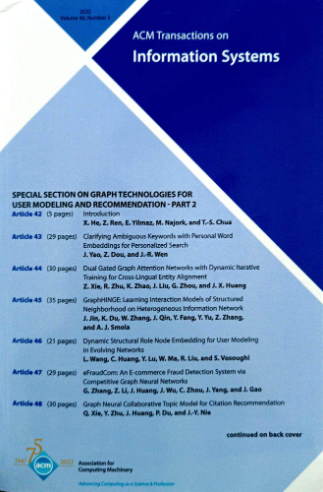基于双对抗性适应的跨领域推荐
IF 5.4
2区 计算机科学
Q1 COMPUTER SCIENCE, INFORMATION SYSTEMS
引用次数: 0
摘要
数据稀缺性是推荐系统面临的一个永恒挑战,研究者们提出了多种跨领域推荐方法来缓解目标领域的数据稀缺性问题。然而,在现实世界的许多跨领域推荐系统中,源领域和目标领域的样本来自不同的数据分布,这阻碍了跨领域的知识转移。在本文中,我们提出针对性地对齐源域和目标域之间的数据分布,以缓解样本分布不平衡,从而挑战目标域的数据稀缺性问题。从技术上讲,我们提出的方法构建了一个双对抗性适应(DAA)框架,与预训练的源模型一起对抗性训练目标模型。两个域鉴别器与目标模型进行二人最小最大博弈,引导目标模型学习可跨域迁移的可靠域不变特征。同时,对目标模型进行标定,学习目标域的特定领域信息。此外,我们将我们的方法制定为一个即插即用模块,以促进现有的推荐系统。我们应用所提出的方法来解决两个大规模工业数据集上真实点击率(CTR)/转化率(CVR)预测中数据不足和样本分布不平衡的问题。我们在有和没有重叠用户/项目的场景下评估了所提出的方法,大量的实验验证了所提出的方法能够显著提高目标域的预测性能。例如,与我们的私人游戏数据集上的单域PLE相比,我们的方法可以在曲线下面积(AUC)方面提高15.4%的PLE性能。此外,在公共数据集上,我们的方法能够比单域MMoE高出6.85%。代码:https://github.com/TL-UESTC/DAA。本文章由计算机程序翻译,如有差异,请以英文原文为准。
Cross-domain Recommendation via Dual Adversarial Adaptation
Data scarcity is a perpetual challenge of recommendation systems, and researchers have proposed a variety of cross-domain recommendation methods to alleviate the problem of data scarcity in target domains. However, in many real-world cross-domain recommendation systems, the source domain and the target domain are sampled from different data distributions, which obstructs the cross-domain knowledge transfer. In this paper, we propose to specifically align the data distributions between the source domain and the target domain to alleviate imbalanced sample distribution and thus challenge the data scarcity issue in the target domain. Technically, our proposed approach builds a dual adversarial adaptation (DAA) framework to adversarially train the target model together with a pre-trained source model. Two domain discriminators play the two-player minmax game with the target model and guide the target model to learn reliable domain-invariant features that can be transferred across domains. At the same time, the target model is calibrated to learn domain-specific information of the target domain. In addition, we formulate our approach as a plug-and-play module to boost existing recommendation systems. We apply the proposed method to address the issues of insufficient data and imbalanced sample distribution in real-world Click-Through Rate (CTR)/Conversion Rate (CVR) predictions on two large-scale industrial datasets. We evaluate the proposed method in scenarios with and without overlapping users/items, and extensive experiments verify that the proposed method is able to significantly improve the prediction performance on the target domain. For instance, our method can boost PLE with a performance improvement of 15.4% in terms of Area Under Curve (AUC) compared with single-domain PLE on our private game dataset. In addition, our method is able to surpass single-domain MMoE by 6.85% on the public datasets. Code: https://github.com/TL-UESTC/DAA.
求助全文
通过发布文献求助,成功后即可免费获取论文全文。
去求助
来源期刊

ACM Transactions on Information Systems
工程技术-计算机:信息系统
CiteScore
9.40
自引率
14.30%
发文量
165
审稿时长
>12 weeks
期刊介绍:
The ACM Transactions on Information Systems (TOIS) publishes papers on information retrieval (such as search engines, recommender systems) that contain:
new principled information retrieval models or algorithms with sound empirical validation;
observational, experimental and/or theoretical studies yielding new insights into information retrieval or information seeking;
accounts of applications of existing information retrieval techniques that shed light on the strengths and weaknesses of the techniques;
formalization of new information retrieval or information seeking tasks and of methods for evaluating the performance on those tasks;
development of content (text, image, speech, video, etc) analysis methods to support information retrieval and information seeking;
development of computational models of user information preferences and interaction behaviors;
creation and analysis of evaluation methodologies for information retrieval and information seeking; or
surveys of existing work that propose a significant synthesis.
The information retrieval scope of ACM Transactions on Information Systems (TOIS) appeals to industry practitioners for its wealth of creative ideas, and to academic researchers for its descriptions of their colleagues'' work.
 求助内容:
求助内容: 应助结果提醒方式:
应助结果提醒方式:


